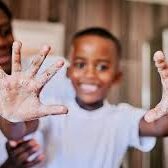Washing your hands is one of the simplest and most effective ways to protect yourself and others from illness. It’s the single most important action we can take to stop the spread of germs.
When Should You Wash Your Hands?
Regular handwashing with soap and running water helps remove germs, prevent sickness, and protect others. If soap and water aren’t available, use an alcohol-based hand sanitizer or hand wipes.
Wash your hands:
- Before, during, and after preparing food
- Before eating
- Before and after caring for someone who is sick
- Before and after treating a cut or wound
- After using the toilet
- After changing diapers or cleaning up a child
- After coughing, sneezing, or blowing your nose
- After touching animals, animal feed, or waste
- After handling pet food or treats
- After touching garbage
- Anytime your hands are visibly dirty
How to Wash Your Hands Properly
- Wet your hands with clean, running water (warm or cold), turn off the tap, and apply soap.
- Lather your hands by rubbing them together—don’t forget the backs, between your fingers, and under your nails.
- Scrub your hands for at least 20 seconds. Need a timer? Hum the “Happy Birthday” song twice.
- Rinse your hands well under clean, running water.
- Dry your hands with a clean towel or air dry them.
When Soap & Water Aren’t Available
Hand Sanitizer (alcohol-based):
- Apply one or two pumps into your palm.
- Rub hands together briskly—front, back, between fingers, and under nails—until completely dry.
Antibacterial Wipes:
- Wipe all surfaces of your hands until clean.
- Use additional wipes if needed.
- Let hands air dry and dispose of wipes properly.
Clean hands save lives. Whether you’re at home, work, school, or on the go,








